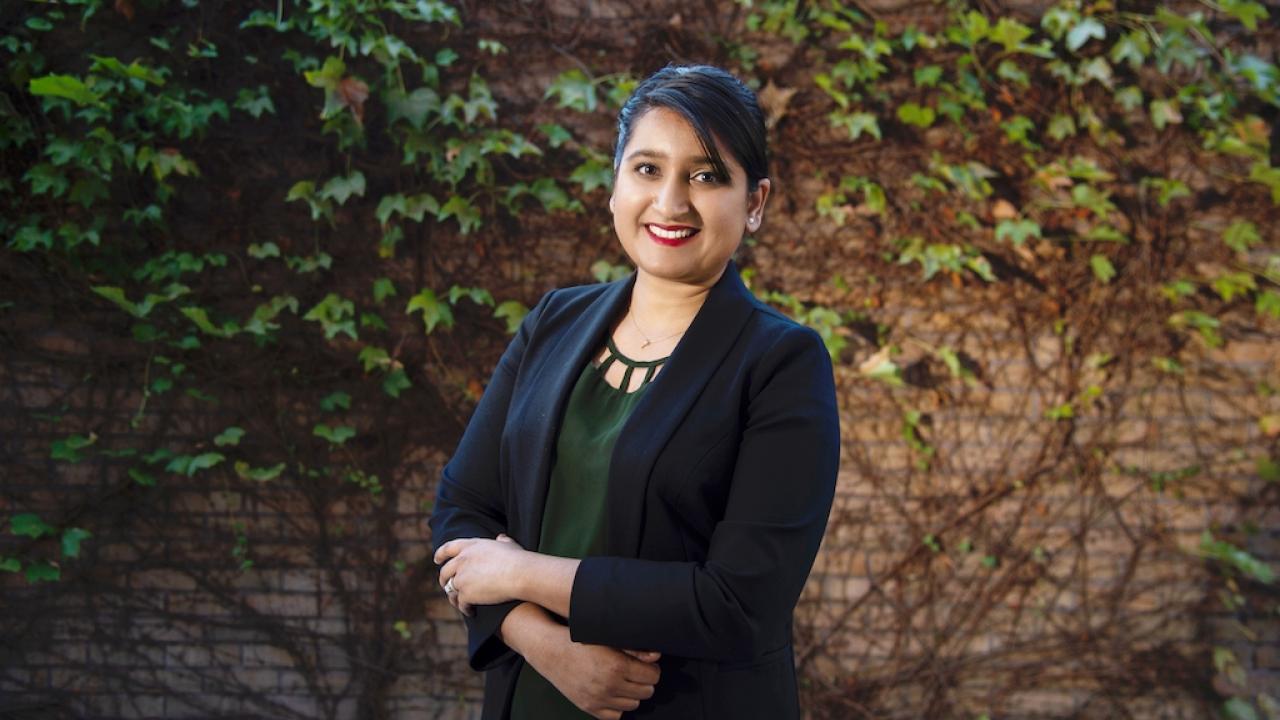
Questions of Heredity: Integrative Genetics and Genomics Ph.D. Student Marwa Zafarullah Wins Emmy Werner and Stanley Jacobsen Fellowship
As a child in Pakistan, Marwa Zafarullah heard the same thing from family friends and neighbors: she looked much more like her mother than her father.
“You’re just like her clone,” they’d say.
And the comments got Marwa thinking, “Why?”
Why did she look more like her mother than her father? And why did her siblings look more like her dad? Such questions of heredity filled Zafarullah’s mind, and at that moment, her curiosity about genetics was born.
Today, at the UC Davis College of Biological Sciences, Zafarullah, a Ph.D. student in the Integrative Genetics and Genomics Graduate Group, investigates the pathology of a rare neurodegenerative disease called Fragile X- Associated Tremor/Ataxia Syndrome (FXTAS). Predominantly affecting men, this debilitating disorder typically manifests after the age of 50. Its progression can be rapid, with symptoms including a substantial decline in movement and cognition. Currently, there are no cures or treatments available for FXTAS.
Zafarullah hopes to change that. As part of her Ph.D. dissertation research, she’s developing a biomarker for the early diagnosis and progression of the disease. For her research, Zafarullah recently won the Emmy Werner and Stanley Jacobsen Fellowship from UC Davis, which is awarded to a graduate student studying genetic aspects of human behavior, health and development.
“It was indeed a pleasant surprise, and I must say that I wouldn’t be able to achieve this without the kind support of my principal investigator Dr. Flora Tassone,” said Zafarullah. “I am also really grateful to my colleagues and my dear family, especially my parents and husband, who is beside me in all the ups of downs of graduate school life.”
“I started with a tiny question,” she added, referencing her childhood curiosity. “Now, I’m studying this big, huge, huge question: How can I help cure this neurodegenerative disorder?”
It all starts with a gene

There’s a genetic commonality among those people predisposed to FXTAS. Their FMR1 gene, responsible for producing a protein (FMRP) integral to brain development, contains excess DNA sequences called CGG repeats. Healthy individuals usually possess between five and 45 CGG repeats. Individuals predisposed to FXTAS possess between 55 to 200 CGG repeats. According toZafarullah, between 40-75 percent of males carrying this FMR1 premutation will develop FXTAS.
Zafarullah is trying to figure out what molecular factors could provide a reliable prediction regarding the early identification and development of the disorder.
Working with Tassone, a professor of biochemistry and molecular medicine at the UC Davis MIND Institute, Zafarullah uses datasets from the world’s first longitudinal study on FXTAS patients to identify biomarkers that may help scientists better track FXTAS’ progression and potentially develop a cure.
“In the last seven years of this study, two distinct categories of participants have emerged: those who developed symptoms that warranted a diagnosis of FXTAS at subsequent visits (converters) and those who did not (non-converters),” said Zafarullah. “Up to this point, I found two different sets of the molecular biomarkers…that were expressed differently at Visit 1 and Visit 2 only in the converters compared to non-converters.”
The first set of biomarkers—recorded during a study participant’s first visit with changes persistent through the second visit—allows for early diagnosis of FXTAS. The second set—recorded during the second visit only—highlights molecular differences between those that develop symptoms (converters) of the disease and those that do not (non-converters).
“I am hoping that with the further investigation of these biomarkers in large groupsets, we can bring them in the clinical setting for developing much needed targeted diagnostics and therapeutics for the treatment of FXTAS patients,” said Zafarullah.
Come for the science, stay for the community
Zafarullah noted that funding from the Emmy Werner and Stanley Jacobsen Fellowship will allow her to focus on her research as she finishes her Ph.D. degree. Initially attracted to UC Davis for its prestigious reputation in the life sciences, she found a home in the Aggie community.
“These past years of my life at UC Davis gave me so much, the beautiful memories of exploring the USA, friends from all different parts of the world, a taste of advanced real-world research, the quest for more knowledge, and a lot that words can’t describe,” she said. “UC DAVIS is a beautifully diverse campus. It provides me a golden opportunity to meet with people from all over the world and experience the wonderfulness of different cultures.”
